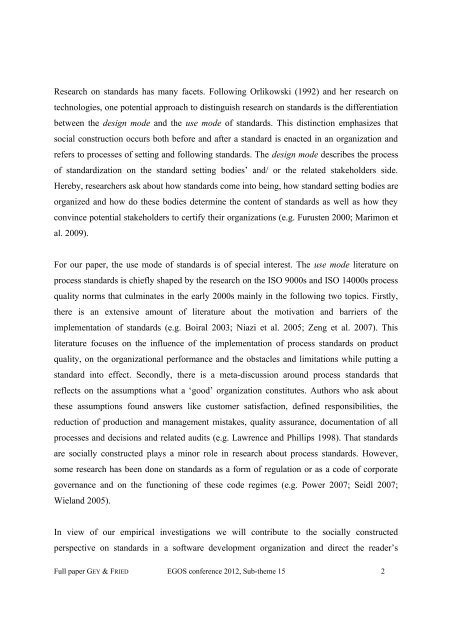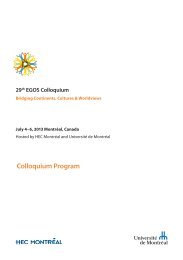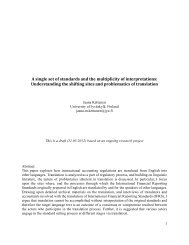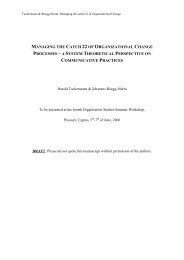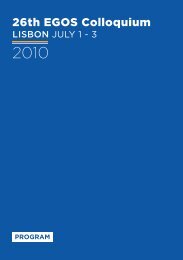Download Full Paper - EGOS
Download Full Paper - EGOS
Download Full Paper - EGOS
You also want an ePaper? Increase the reach of your titles
YUMPU automatically turns print PDFs into web optimized ePapers that Google loves.
Research on standards has many facets. Following Orlikowski (1992) and her research on<br />
technologies, one potential approach to distinguish research on standards is the differentiation<br />
between the design mode and the use mode of standards. This distinction emphasizes that<br />
social construction occurs both before and after a standard is enacted in an organization and<br />
refers to processes of setting and following standards. The design mode describes the process<br />
of standardization on the standard setting bodies’ and/ or the related stakeholders side.<br />
Hereby, researchers ask about how standards come into being, how standard setting bodies are<br />
organized and how do these bodies determine the content of standards as well as how they<br />
convince potential stakeholders to certify their organizations (e.g. Furusten 2000; Marimon et<br />
al. 2009).<br />
For our paper, the use mode of standards is of special interest. The use mode literature on<br />
process standards is chiefly shaped by the research on the ISO 9000s and ISO 14000s process<br />
quality norms that culminates in the early 2000s mainly in the following two topics. Firstly,<br />
there is an extensive amount of literature about the motivation and barriers of the<br />
implementation of standards (e.g. Boiral 2003; Niazi et al. 2005; Zeng et al. 2007). This<br />
literature focuses on the influence of the implementation of process standards on product<br />
quality, on the organizational performance and the obstacles and limitations while putting a<br />
standard into effect. Secondly, there is a meta-discussion around process standards that<br />
reflects on the assumptions what a ‘good’ organization constitutes. Authors who ask about<br />
these assumptions found answers like customer satisfaction, defined responsibilities, the<br />
reduction of production and management mistakes, quality assurance, documentation of all<br />
processes and decisions and related audits (e.g. Lawrence and Phillips 1998). That standards<br />
are socially constructed plays a minor role in research about process standards. However,<br />
some research has been done on standards as a form of regulation or as a code of corporate<br />
governance and on the functioning of these code regimes (e.g. Power 2007; Seidl 2007;<br />
Wieland 2005).<br />
In view of our empirical investigations we will contribute to the socially constructed<br />
perspective on standards in a software development organization and direct the reader’s<br />
<strong>Full</strong> paper GEY & FRIED <strong>EGOS</strong> conference 2012, Sub-theme 15 2


